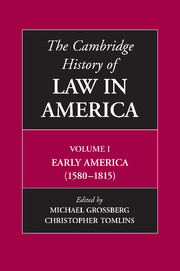Book contents
- Frontmatter
- 1 Law, Colonization, Legitimation, and the European Background
- 2 The Law of Native Americans, to 1815
- 3 English Settlement and Local Governance
- 4 Legal Communications and Imperial Governance: British North America and Spanish America Compared
- 5 Regionalism in Early American Law
- 6 Penality and the Colonial Project: Crime, Punishment, and the Regulation of Morals in Early America
- 7 Law, Population, Labor
- 8 The Fragmented Laws of Slavery in the Colonial and Revolutionary Eras
- 9 The Transformation of Domestic Law
- 10 Law and Religion in Colonial America
- 11 The Transformation of Law and Economy in Early America
- 12 Law and Commerce, 1580–1815
- 13 Law and the Origins of the American Revolution
- 14 Confederation and Constitution
- 15 The Consolidation of the Early Federal System, 1791–1812
- 16 Magistrates, Common Law Lawyers, Legislators: The Three Legal Systems of British America
- Bibliographic Essays
- Notes on Contributors
- Index
- References
11 - The Transformation of Law and Economy in Early America
Published online by Cambridge University Press: 28 November 2008
- Frontmatter
- 1 Law, Colonization, Legitimation, and the European Background
- 2 The Law of Native Americans, to 1815
- 3 English Settlement and Local Governance
- 4 Legal Communications and Imperial Governance: British North America and Spanish America Compared
- 5 Regionalism in Early American Law
- 6 Penality and the Colonial Project: Crime, Punishment, and the Regulation of Morals in Early America
- 7 Law, Population, Labor
- 8 The Fragmented Laws of Slavery in the Colonial and Revolutionary Eras
- 9 The Transformation of Domestic Law
- 10 Law and Religion in Colonial America
- 11 The Transformation of Law and Economy in Early America
- 12 Law and Commerce, 1580–1815
- 13 Law and the Origins of the American Revolution
- 14 Confederation and Constitution
- 15 The Consolidation of the Early Federal System, 1791–1812
- 16 Magistrates, Common Law Lawyers, Legislators: The Three Legal Systems of British America
- Bibliographic Essays
- Notes on Contributors
- Index
- References
Summary
Scholarship on law and the economy often has a chicken-and-egg quality. Is law a tool wielded instrumentally to effect specific economic ends, or does it emerge functionally from particular economic needs? Most such writing addresses the nineteenth century, but it serves as a caution for earlier centuries, despite, or perhaps because of, the comparative paucity of work on law and the economy in the colonial period. What makes the caution necessary is that, notwithstanding a certain heuristic value, the dichotomy misleads and oversimplifies. It could hardly be otherwise, given the pervasiveness in society of both law and economy. Things legal and things economic are everywhere any moderately perceptive historian looks, by their very profusion interacting in complex ways. Moreover, one cannot talk of law and economy in the seventeenth and eighteenth centuries as though each was a single, unitary construct. There were many laws – or, perhaps more helpfully, many legalities – and many economies, as diverse and diversified as we now know British North America itself to have been. The task at hand is to sort out the myriad strands and see if they can be woven into a coherent story or set of stories about law and the economy in the seventeenth and eighteenth centuries.
- Type
- Chapter
- Information
- The Cambridge History of Law in America , pp. 365 - 399Publisher: Cambridge University PressPrint publication year: 2008



